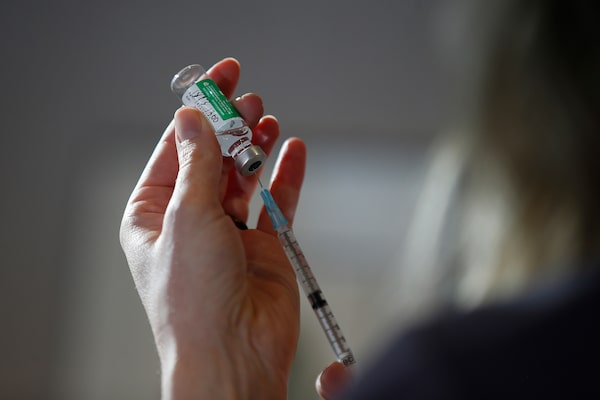
Canada’s deputy chief public health officer says widespread use of COVID-19 boosters and influenza shots could help the country avoid a repeat of last fall and winter, when an unusually brutal respiratory illness season overwhelmed hospitals.JOHN WOODS/The Canadian Press
Canadians who have gone more than six months without a COVID-19 shot or infection should get a booster with a new formulation of the vaccine this fall, according to the experts who guide the country’s vaccination policies.
In formal recommendations released Tuesday, the National Advisory Committee on Immunization (NACI) came out in favour of autumn doses for every age group for which boosters are approved, but emphasized the importance of extra jabs for those most vulnerable to COVID, including senior citizens, pregnant women, Indigenous people and immunocompromised patients.
NACI also endorsed giving COVID-19 boosters and flu shots at the same time – a strategy the panel hopes will increase uptake of both vaccines.
Howard Njoo, Canada’s deputy chief public health officer, said widespread use of COVID-19 boosters and influenza shots could help the country avoid a repeat of last fall and winter, when an unusually brutal respiratory illness season overwhelmed hospitals.
“We really want to be as prepared as possible and in prevention mode. That’s why NACI put out this statement,” Dr. Njoo said. “The bottom line is that, hey, if it’s been over six months since your last dose or infection, then you should get an additional dose.”
NACI provides scientific advice on vaccination. The federal government procures vaccines, while provincial and territorial governments roll out the shots.
Boosters are necessary because most evidence points to the vaccine’s effectiveness beginning to wane around the six-month mark, Dr. Njoo said. As well, the rapid evolution of the virus that causes COVID-19 means the variants circulating now are better able to escape the immunity provided by older versions of the vaccines.
The NACI document doesn’t specify which booster Canadians should receive, other than to say it should be a “new formulation.” However, Dr. Njoo said it’s most likely that Canada’s fall boosters will be mRNA shots targeting an Omicron sublineage called XBB.1.5, the same formulation a U.S. Food and Drug Administration advisory committee endorsed last month.
Although Canada was a world leader in vaccine uptake when COVID shots became widely available in 2021, booster doses haven’t proved as popular. As of last month, 84.2 per cent of Canadians over the age of five had completed their primary vaccine series, which usually means two doses of an mRNA vaccine. (That figure excludes Quebec.)
Just under 6 per cent of Canadians have either completed their primary series or received a booster in the last six months, according to the latest Public Health Agency data. About 22 per cent of people over 80 received a booster dose in that period.
The World Health Organization declared a formal end to the COVID-19 pandemic emergency in May.